Special Needs Children in Early Childhood Education - Assignment
VerifiedAdded on 2019/09/30
|10
|2377
|405
Homework Assignment
AI Summary
This assignment addresses the educational needs of special needs children in early childhood, focusing on IEPs and IFSPs for children with disabilities. It explores goals for these plans, including American Sign Language, awareness of future challenges, and co-curricular activities. The assignment outlines activities like puzzles and toddler-play scrabble, modified play activities, and methods for fostering independence. It discusses how to integrate a child into a center, including accommodations and the benefits of interaction with children without disabilities. The role of paraprofessionals, parental involvement, and program adaptations are also discussed. The assignment emphasizes the importance of understanding a child's needs, building self-assurance, and creating a supportive environment for their development. The goal is to help these children become independent and successful through tailored support from educators, parents, and paraprofessionals. The assignment also highlights the importance of emotional support and optimism for the child's overall well-being.
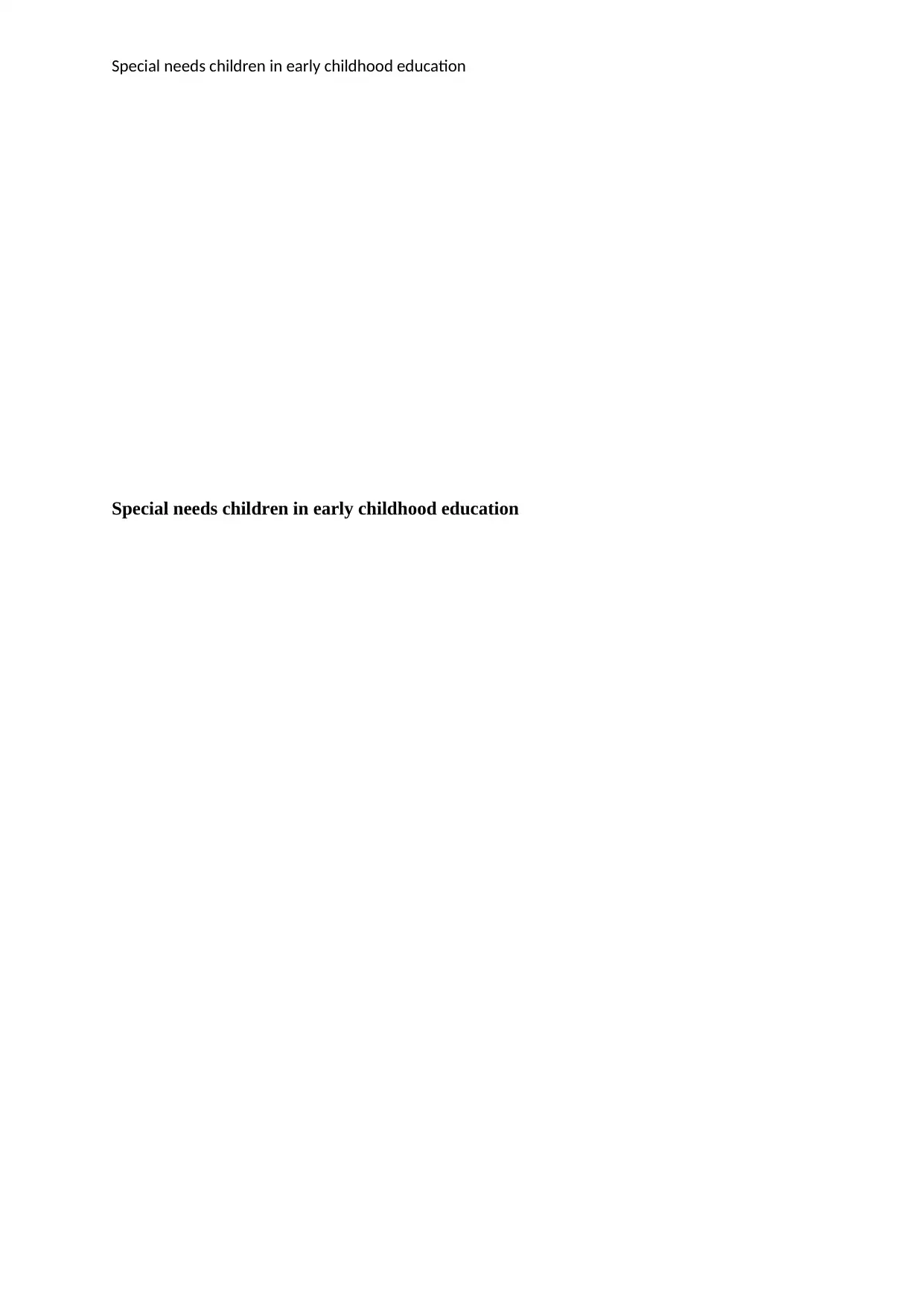
Special needs children in early childhood education
Special needs children in early childhood education
Special needs children in early childhood education
Paraphrase This Document
Need a fresh take? Get an instant paraphrase of this document with our AI Paraphraser
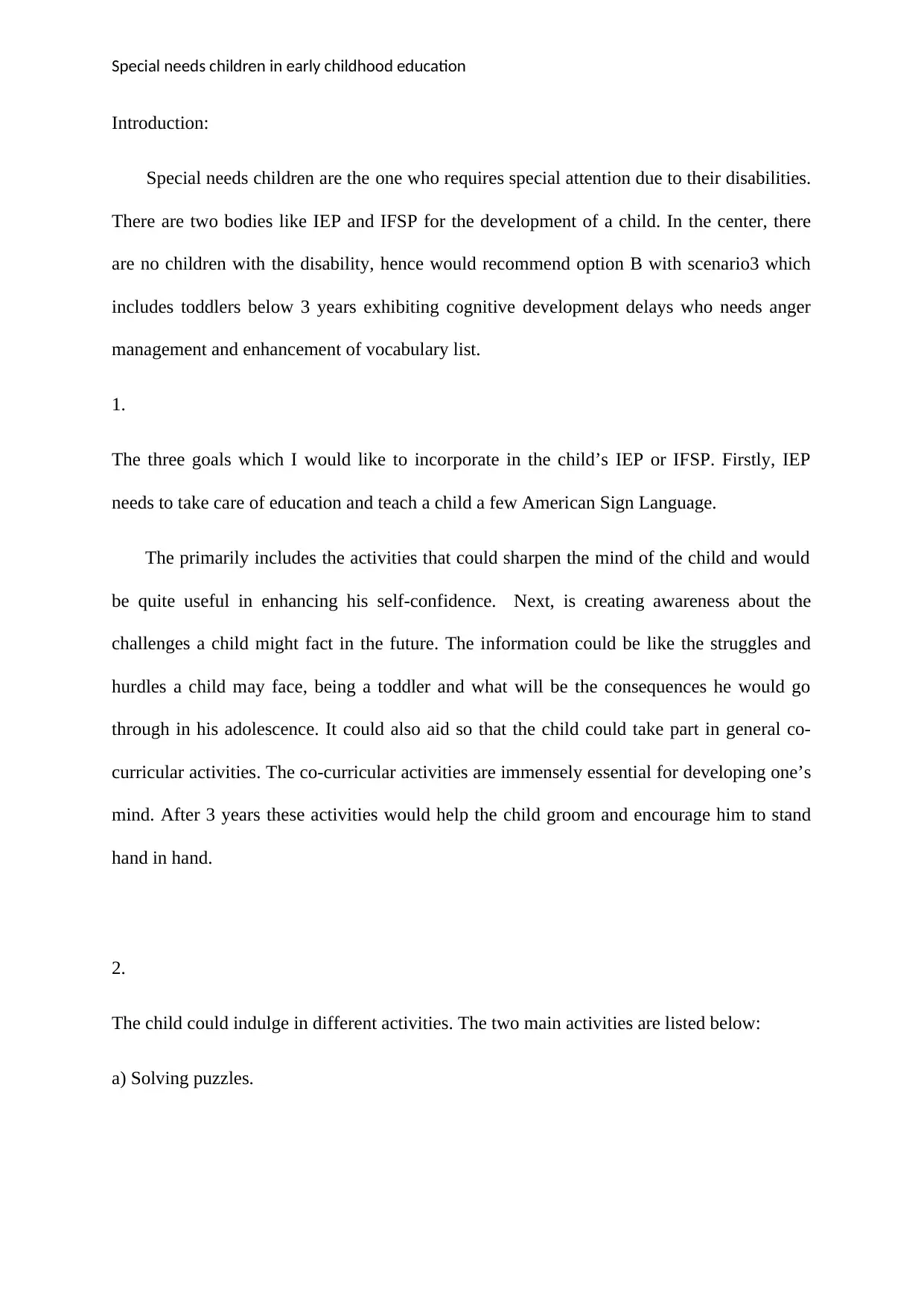
Special needs children in early childhood education
Introduction:
Special needs children are the one who requires special attention due to their disabilities.
There are two bodies like IEP and IFSP for the development of a child. In the center, there
are no children with the disability, hence would recommend option B with scenario3 which
includes toddlers below 3 years exhibiting cognitive development delays who needs anger
management and enhancement of vocabulary list.
1.
The three goals which I would like to incorporate in the child’s IEP or IFSP. Firstly, IEP
needs to take care of education and teach a child a few American Sign Language.
The primarily includes the activities that could sharpen the mind of the child and would
be quite useful in enhancing his self-confidence. Next, is creating awareness about the
challenges a child might fact in the future. The information could be like the struggles and
hurdles a child may face, being a toddler and what will be the consequences he would go
through in his adolescence. It could also aid so that the child could take part in general co-
curricular activities. The co-curricular activities are immensely essential for developing one’s
mind. After 3 years these activities would help the child groom and encourage him to stand
hand in hand.
2.
The child could indulge in different activities. The two main activities are listed below:
a) Solving puzzles.
Introduction:
Special needs children are the one who requires special attention due to their disabilities.
There are two bodies like IEP and IFSP for the development of a child. In the center, there
are no children with the disability, hence would recommend option B with scenario3 which
includes toddlers below 3 years exhibiting cognitive development delays who needs anger
management and enhancement of vocabulary list.
1.
The three goals which I would like to incorporate in the child’s IEP or IFSP. Firstly, IEP
needs to take care of education and teach a child a few American Sign Language.
The primarily includes the activities that could sharpen the mind of the child and would
be quite useful in enhancing his self-confidence. Next, is creating awareness about the
challenges a child might fact in the future. The information could be like the struggles and
hurdles a child may face, being a toddler and what will be the consequences he would go
through in his adolescence. It could also aid so that the child could take part in general co-
curricular activities. The co-curricular activities are immensely essential for developing one’s
mind. After 3 years these activities would help the child groom and encourage him to stand
hand in hand.
2.
The child could indulge in different activities. The two main activities are listed below:
a) Solving puzzles.
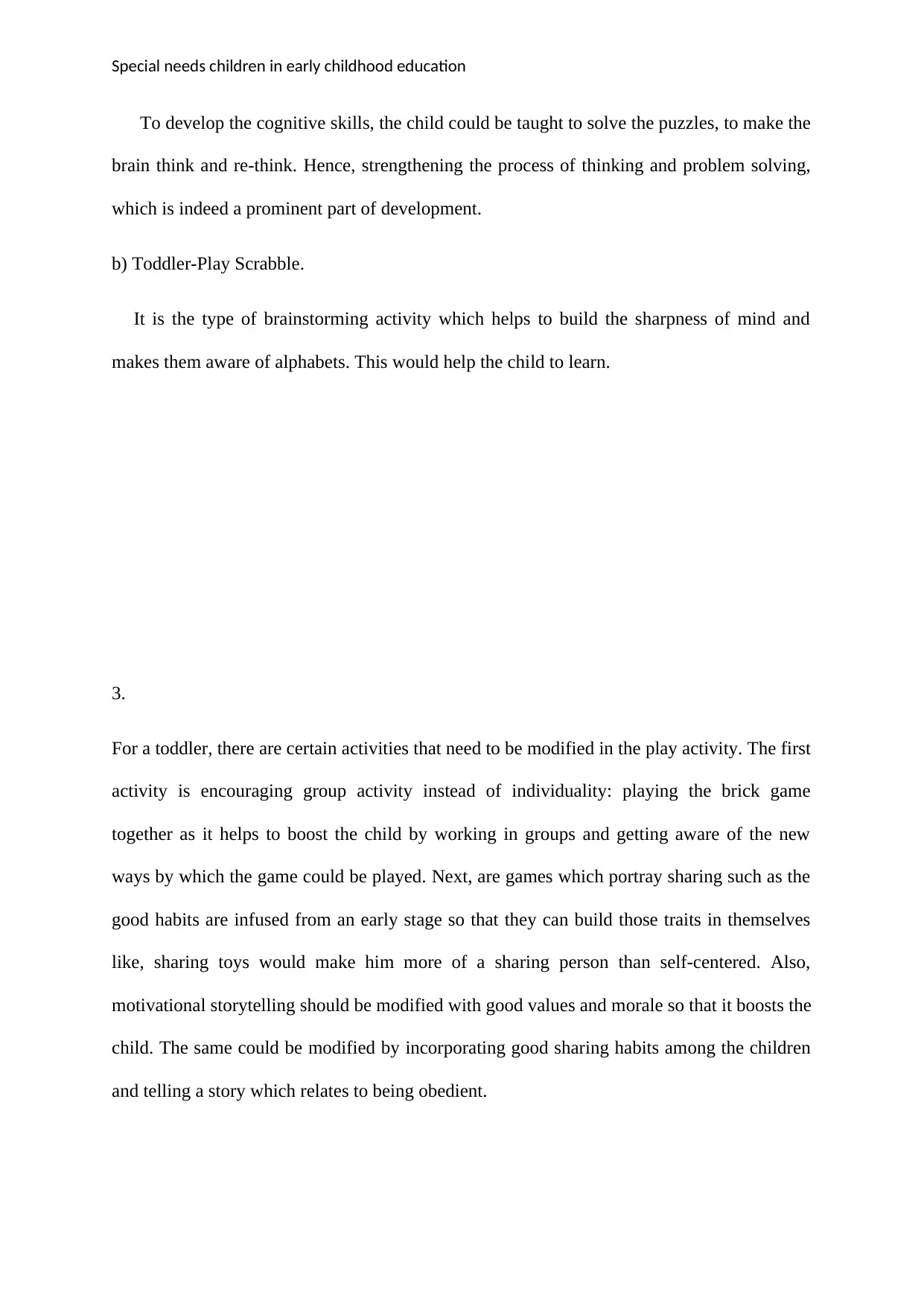
Special needs children in early childhood education
To develop the cognitive skills, the child could be taught to solve the puzzles, to make the
brain think and re-think. Hence, strengthening the process of thinking and problem solving,
which is indeed a prominent part of development.
b) Toddler-Play Scrabble.
It is the type of brainstorming activity which helps to build the sharpness of mind and
makes them aware of alphabets. This would help the child to learn.
3.
For a toddler, there are certain activities that need to be modified in the play activity. The first
activity is encouraging group activity instead of individuality: playing the brick game
together as it helps to boost the child by working in groups and getting aware of the new
ways by which the game could be played. Next, are games which portray sharing such as the
good habits are infused from an early stage so that they can build those traits in themselves
like, sharing toys would make him more of a sharing person than self-centered. Also,
motivational storytelling should be modified with good values and morale so that it boosts the
child. The same could be modified by incorporating good sharing habits among the children
and telling a story which relates to being obedient.
To develop the cognitive skills, the child could be taught to solve the puzzles, to make the
brain think and re-think. Hence, strengthening the process of thinking and problem solving,
which is indeed a prominent part of development.
b) Toddler-Play Scrabble.
It is the type of brainstorming activity which helps to build the sharpness of mind and
makes them aware of alphabets. This would help the child to learn.
3.
For a toddler, there are certain activities that need to be modified in the play activity. The first
activity is encouraging group activity instead of individuality: playing the brick game
together as it helps to boost the child by working in groups and getting aware of the new
ways by which the game could be played. Next, are games which portray sharing such as the
good habits are infused from an early stage so that they can build those traits in themselves
like, sharing toys would make him more of a sharing person than self-centered. Also,
motivational storytelling should be modified with good values and morale so that it boosts the
child. The same could be modified by incorporating good sharing habits among the children
and telling a story which relates to being obedient.
⊘ This is a preview!⊘
Do you want full access?
Subscribe today to unlock all pages.

Trusted by 1+ million students worldwide
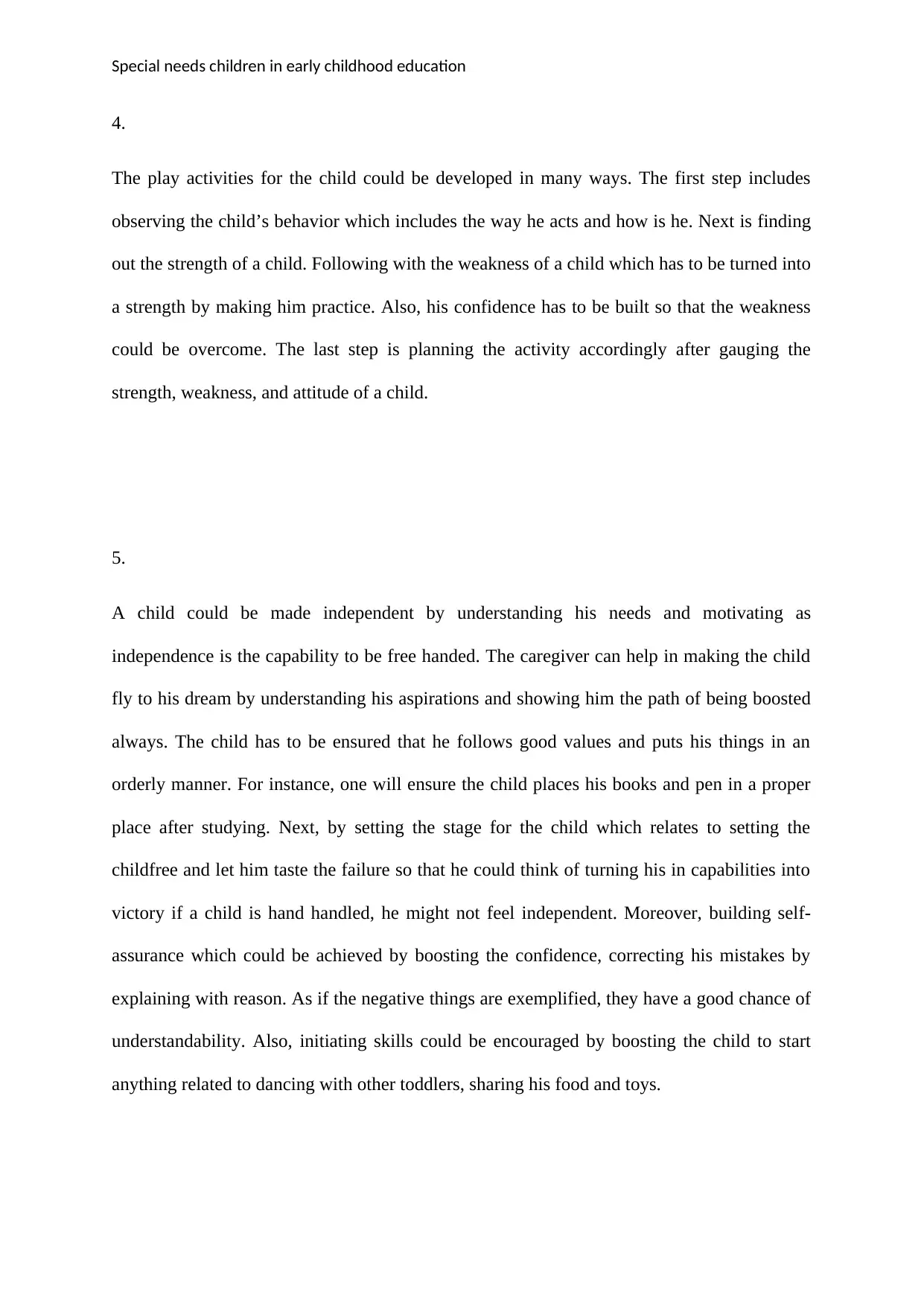
Special needs children in early childhood education
4.
The play activities for the child could be developed in many ways. The first step includes
observing the child’s behavior which includes the way he acts and how is he. Next is finding
out the strength of a child. Following with the weakness of a child which has to be turned into
a strength by making him practice. Also, his confidence has to be built so that the weakness
could be overcome. The last step is planning the activity accordingly after gauging the
strength, weakness, and attitude of a child.
5.
A child could be made independent by understanding his needs and motivating as
independence is the capability to be free handed. The caregiver can help in making the child
fly to his dream by understanding his aspirations and showing him the path of being boosted
always. The child has to be ensured that he follows good values and puts his things in an
orderly manner. For instance, one will ensure the child places his books and pen in a proper
place after studying. Next, by setting the stage for the child which relates to setting the
childfree and let him taste the failure so that he could think of turning his in capabilities into
victory if a child is hand handled, he might not feel independent. Moreover, building self-
assurance which could be achieved by boosting the confidence, correcting his mistakes by
explaining with reason. As if the negative things are exemplified, they have a good chance of
understandability. Also, initiating skills could be encouraged by boosting the child to start
anything related to dancing with other toddlers, sharing his food and toys.
4.
The play activities for the child could be developed in many ways. The first step includes
observing the child’s behavior which includes the way he acts and how is he. Next is finding
out the strength of a child. Following with the weakness of a child which has to be turned into
a strength by making him practice. Also, his confidence has to be built so that the weakness
could be overcome. The last step is planning the activity accordingly after gauging the
strength, weakness, and attitude of a child.
5.
A child could be made independent by understanding his needs and motivating as
independence is the capability to be free handed. The caregiver can help in making the child
fly to his dream by understanding his aspirations and showing him the path of being boosted
always. The child has to be ensured that he follows good values and puts his things in an
orderly manner. For instance, one will ensure the child places his books and pen in a proper
place after studying. Next, by setting the stage for the child which relates to setting the
childfree and let him taste the failure so that he could think of turning his in capabilities into
victory if a child is hand handled, he might not feel independent. Moreover, building self-
assurance which could be achieved by boosting the confidence, correcting his mistakes by
explaining with reason. As if the negative things are exemplified, they have a good chance of
understandability. Also, initiating skills could be encouraged by boosting the child to start
anything related to dancing with other toddlers, sharing his food and toys.
Paraphrase This Document
Need a fresh take? Get an instant paraphrase of this document with our AI Paraphraser
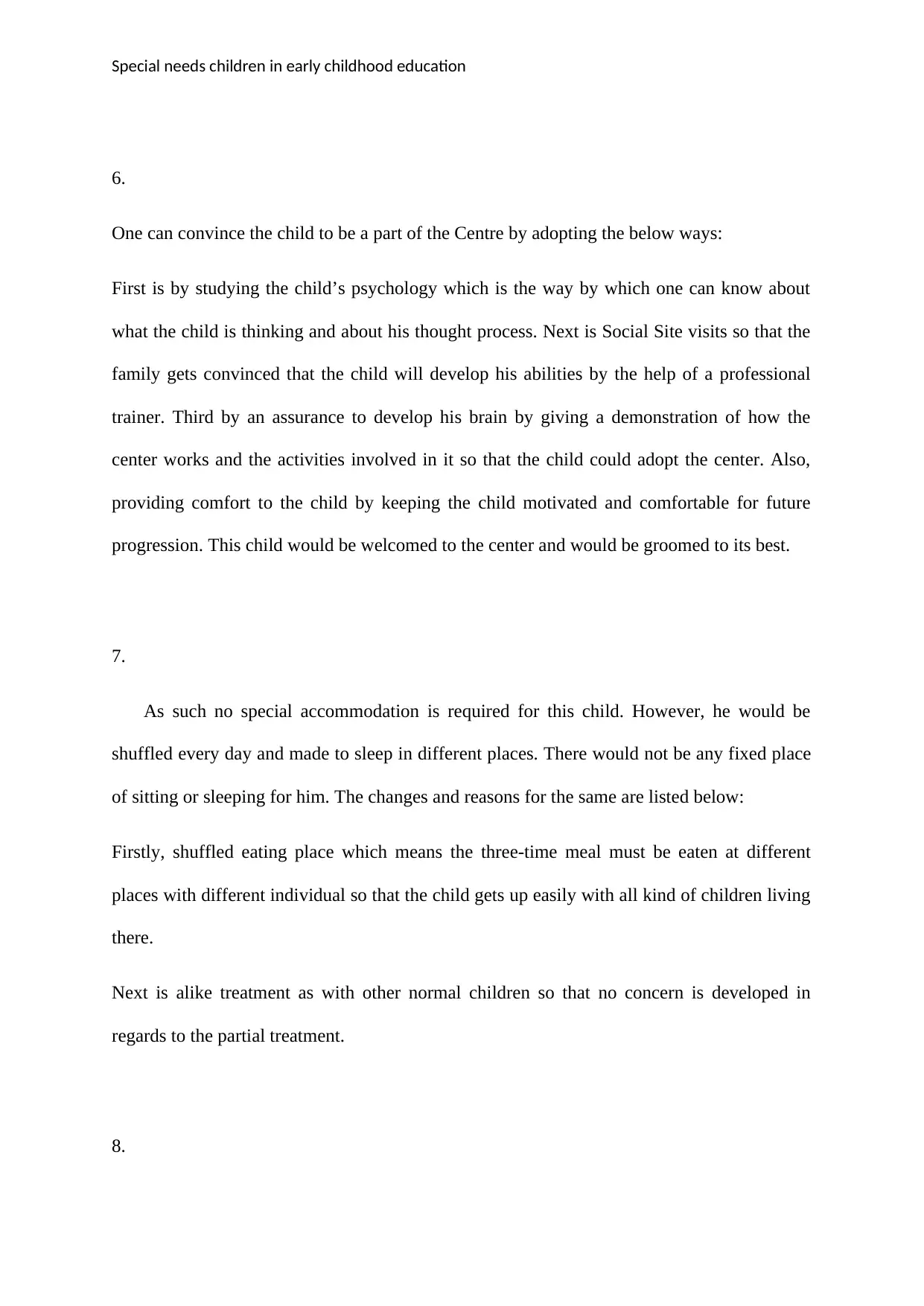
Special needs children in early childhood education
6.
One can convince the child to be a part of the Centre by adopting the below ways:
First is by studying the child’s psychology which is the way by which one can know about
what the child is thinking and about his thought process. Next is Social Site visits so that the
family gets convinced that the child will develop his abilities by the help of a professional
trainer. Third by an assurance to develop his brain by giving a demonstration of how the
center works and the activities involved in it so that the child could adopt the center. Also,
providing comfort to the child by keeping the child motivated and comfortable for future
progression. This child would be welcomed to the center and would be groomed to its best.
7.
As such no special accommodation is required for this child. However, he would be
shuffled every day and made to sleep in different places. There would not be any fixed place
of sitting or sleeping for him. The changes and reasons for the same are listed below:
Firstly, shuffled eating place which means the three-time meal must be eaten at different
places with different individual so that the child gets up easily with all kind of children living
there.
Next is alike treatment as with other normal children so that no concern is developed in
regards to the partial treatment.
8.
6.
One can convince the child to be a part of the Centre by adopting the below ways:
First is by studying the child’s psychology which is the way by which one can know about
what the child is thinking and about his thought process. Next is Social Site visits so that the
family gets convinced that the child will develop his abilities by the help of a professional
trainer. Third by an assurance to develop his brain by giving a demonstration of how the
center works and the activities involved in it so that the child could adopt the center. Also,
providing comfort to the child by keeping the child motivated and comfortable for future
progression. This child would be welcomed to the center and would be groomed to its best.
7.
As such no special accommodation is required for this child. However, he would be
shuffled every day and made to sleep in different places. There would not be any fixed place
of sitting or sleeping for him. The changes and reasons for the same are listed below:
Firstly, shuffled eating place which means the three-time meal must be eaten at different
places with different individual so that the child gets up easily with all kind of children living
there.
Next is alike treatment as with other normal children so that no concern is developed in
regards to the partial treatment.
8.
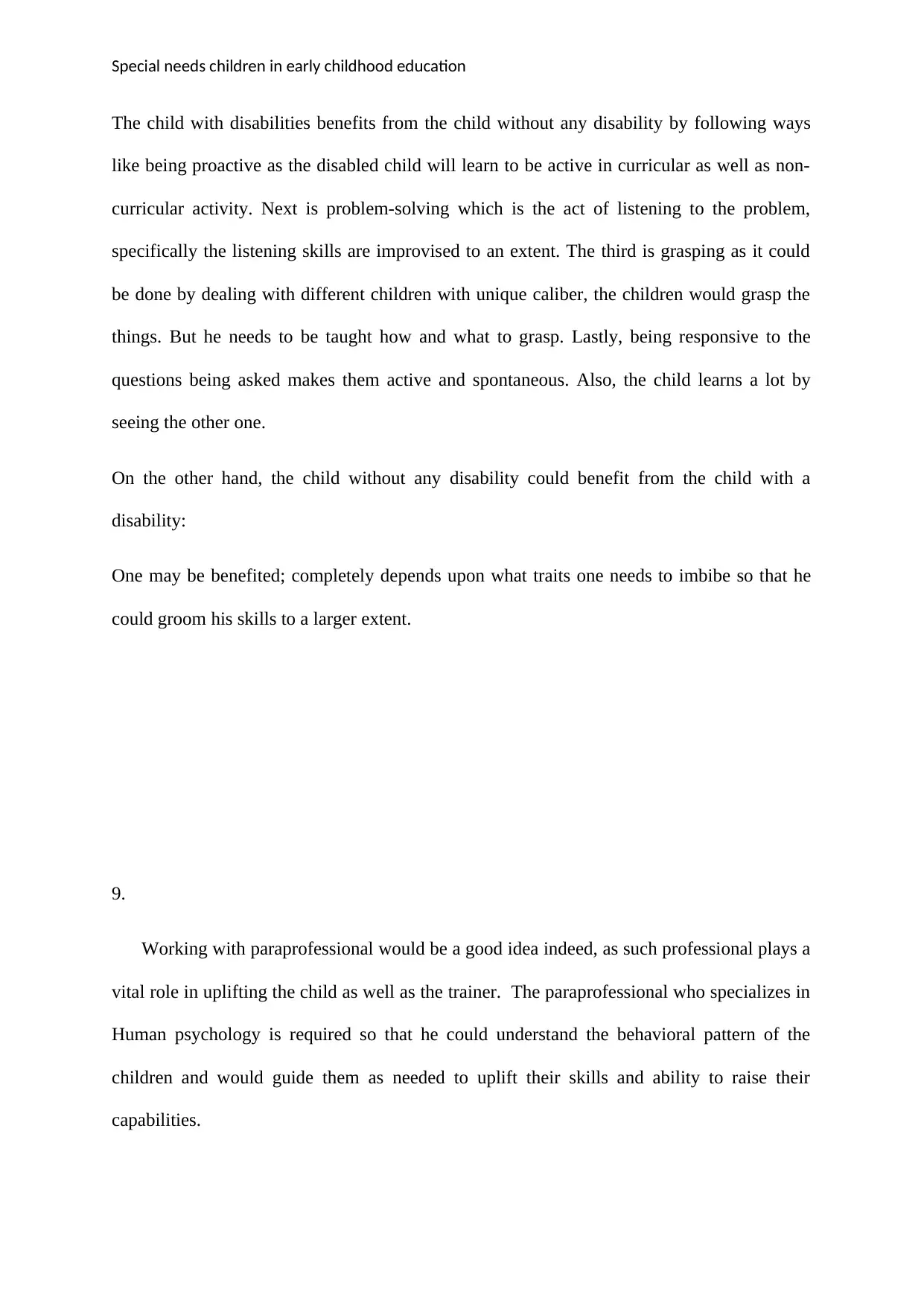
Special needs children in early childhood education
The child with disabilities benefits from the child without any disability by following ways
like being proactive as the disabled child will learn to be active in curricular as well as non-
curricular activity. Next is problem-solving which is the act of listening to the problem,
specifically the listening skills are improvised to an extent. The third is grasping as it could
be done by dealing with different children with unique caliber, the children would grasp the
things. But he needs to be taught how and what to grasp. Lastly, being responsive to the
questions being asked makes them active and spontaneous. Also, the child learns a lot by
seeing the other one.
On the other hand, the child without any disability could benefit from the child with a
disability:
One may be benefited; completely depends upon what traits one needs to imbibe so that he
could groom his skills to a larger extent.
9.
Working with paraprofessional would be a good idea indeed, as such professional plays a
vital role in uplifting the child as well as the trainer. The paraprofessional who specializes in
Human psychology is required so that he could understand the behavioral pattern of the
children and would guide them as needed to uplift their skills and ability to raise their
capabilities.
The child with disabilities benefits from the child without any disability by following ways
like being proactive as the disabled child will learn to be active in curricular as well as non-
curricular activity. Next is problem-solving which is the act of listening to the problem,
specifically the listening skills are improvised to an extent. The third is grasping as it could
be done by dealing with different children with unique caliber, the children would grasp the
things. But he needs to be taught how and what to grasp. Lastly, being responsive to the
questions being asked makes them active and spontaneous. Also, the child learns a lot by
seeing the other one.
On the other hand, the child without any disability could benefit from the child with a
disability:
One may be benefited; completely depends upon what traits one needs to imbibe so that he
could groom his skills to a larger extent.
9.
Working with paraprofessional would be a good idea indeed, as such professional plays a
vital role in uplifting the child as well as the trainer. The paraprofessional who specializes in
Human psychology is required so that he could understand the behavioral pattern of the
children and would guide them as needed to uplift their skills and ability to raise their
capabilities.
⊘ This is a preview!⊘
Do you want full access?
Subscribe today to unlock all pages.

Trusted by 1+ million students worldwide
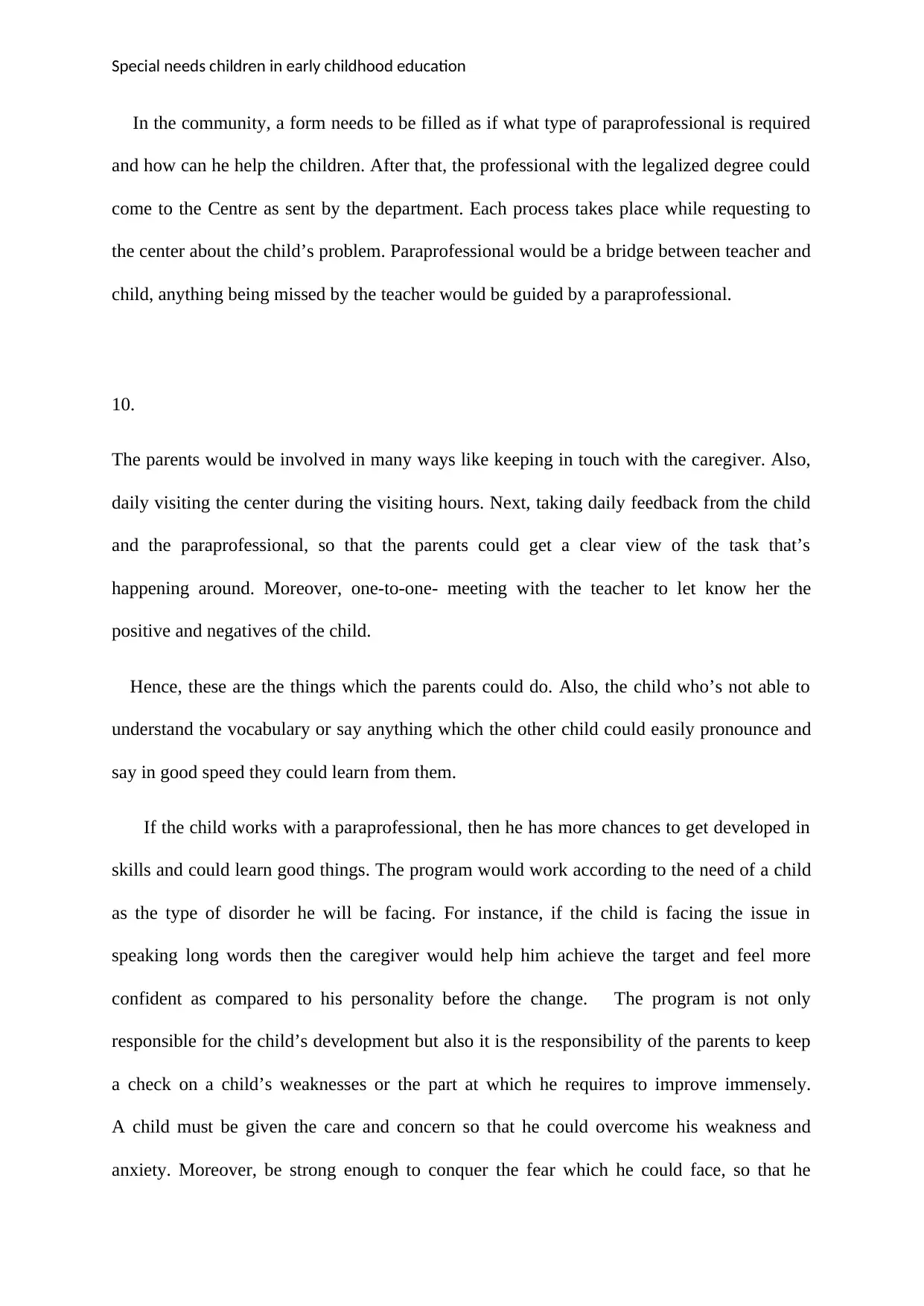
Special needs children in early childhood education
In the community, a form needs to be filled as if what type of paraprofessional is required
and how can he help the children. After that, the professional with the legalized degree could
come to the Centre as sent by the department. Each process takes place while requesting to
the center about the child’s problem. Paraprofessional would be a bridge between teacher and
child, anything being missed by the teacher would be guided by a paraprofessional.
10.
The parents would be involved in many ways like keeping in touch with the caregiver. Also,
daily visiting the center during the visiting hours. Next, taking daily feedback from the child
and the paraprofessional, so that the parents could get a clear view of the task that’s
happening around. Moreover, one-to-one- meeting with the teacher to let know her the
positive and negatives of the child.
Hence, these are the things which the parents could do. Also, the child who’s not able to
understand the vocabulary or say anything which the other child could easily pronounce and
say in good speed they could learn from them.
If the child works with a paraprofessional, then he has more chances to get developed in
skills and could learn good things. The program would work according to the need of a child
as the type of disorder he will be facing. For instance, if the child is facing the issue in
speaking long words then the caregiver would help him achieve the target and feel more
confident as compared to his personality before the change. The program is not only
responsible for the child’s development but also it is the responsibility of the parents to keep
a check on a child’s weaknesses or the part at which he requires to improve immensely.
A child must be given the care and concern so that he could overcome his weakness and
anxiety. Moreover, be strong enough to conquer the fear which he could face, so that he
In the community, a form needs to be filled as if what type of paraprofessional is required
and how can he help the children. After that, the professional with the legalized degree could
come to the Centre as sent by the department. Each process takes place while requesting to
the center about the child’s problem. Paraprofessional would be a bridge between teacher and
child, anything being missed by the teacher would be guided by a paraprofessional.
10.
The parents would be involved in many ways like keeping in touch with the caregiver. Also,
daily visiting the center during the visiting hours. Next, taking daily feedback from the child
and the paraprofessional, so that the parents could get a clear view of the task that’s
happening around. Moreover, one-to-one- meeting with the teacher to let know her the
positive and negatives of the child.
Hence, these are the things which the parents could do. Also, the child who’s not able to
understand the vocabulary or say anything which the other child could easily pronounce and
say in good speed they could learn from them.
If the child works with a paraprofessional, then he has more chances to get developed in
skills and could learn good things. The program would work according to the need of a child
as the type of disorder he will be facing. For instance, if the child is facing the issue in
speaking long words then the caregiver would help him achieve the target and feel more
confident as compared to his personality before the change. The program is not only
responsible for the child’s development but also it is the responsibility of the parents to keep
a check on a child’s weaknesses or the part at which he requires to improve immensely.
A child must be given the care and concern so that he could overcome his weakness and
anxiety. Moreover, be strong enough to conquer the fear which he could face, so that he
Paraphrase This Document
Need a fresh take? Get an instant paraphrase of this document with our AI Paraphraser
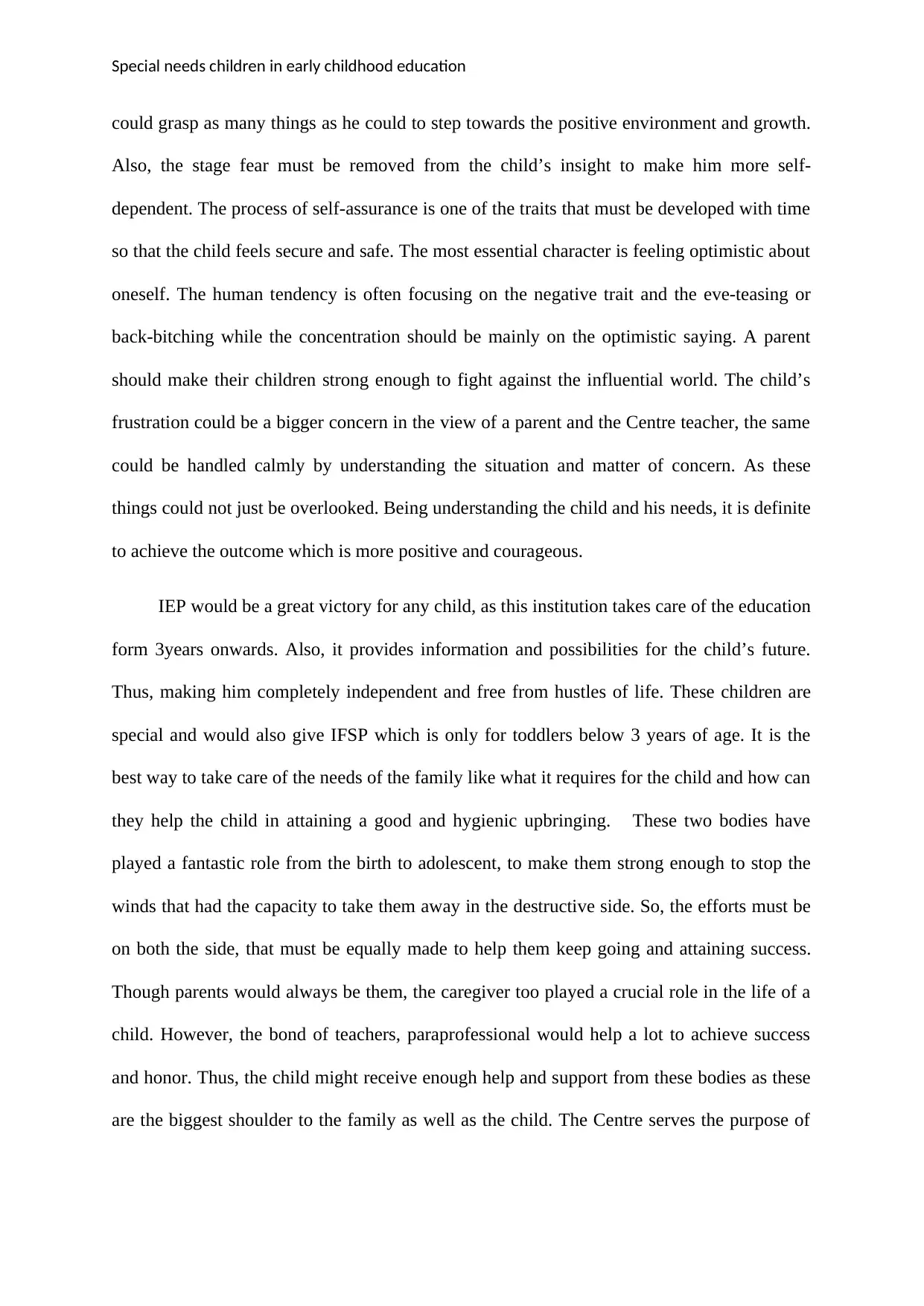
Special needs children in early childhood education
could grasp as many things as he could to step towards the positive environment and growth.
Also, the stage fear must be removed from the child’s insight to make him more self-
dependent. The process of self-assurance is one of the traits that must be developed with time
so that the child feels secure and safe. The most essential character is feeling optimistic about
oneself. The human tendency is often focusing on the negative trait and the eve-teasing or
back-bitching while the concentration should be mainly on the optimistic saying. A parent
should make their children strong enough to fight against the influential world. The child’s
frustration could be a bigger concern in the view of a parent and the Centre teacher, the same
could be handled calmly by understanding the situation and matter of concern. As these
things could not just be overlooked. Being understanding the child and his needs, it is definite
to achieve the outcome which is more positive and courageous.
IEP would be a great victory for any child, as this institution takes care of the education
form 3years onwards. Also, it provides information and possibilities for the child’s future.
Thus, making him completely independent and free from hustles of life. These children are
special and would also give IFSP which is only for toddlers below 3 years of age. It is the
best way to take care of the needs of the family like what it requires for the child and how can
they help the child in attaining a good and hygienic upbringing. These two bodies have
played a fantastic role from the birth to adolescent, to make them strong enough to stop the
winds that had the capacity to take them away in the destructive side. So, the efforts must be
on both the side, that must be equally made to help them keep going and attaining success.
Though parents would always be them, the caregiver too played a crucial role in the life of a
child. However, the bond of teachers, paraprofessional would help a lot to achieve success
and honor. Thus, the child might receive enough help and support from these bodies as these
are the biggest shoulder to the family as well as the child. The Centre serves the purpose of
could grasp as many things as he could to step towards the positive environment and growth.
Also, the stage fear must be removed from the child’s insight to make him more self-
dependent. The process of self-assurance is one of the traits that must be developed with time
so that the child feels secure and safe. The most essential character is feeling optimistic about
oneself. The human tendency is often focusing on the negative trait and the eve-teasing or
back-bitching while the concentration should be mainly on the optimistic saying. A parent
should make their children strong enough to fight against the influential world. The child’s
frustration could be a bigger concern in the view of a parent and the Centre teacher, the same
could be handled calmly by understanding the situation and matter of concern. As these
things could not just be overlooked. Being understanding the child and his needs, it is definite
to achieve the outcome which is more positive and courageous.
IEP would be a great victory for any child, as this institution takes care of the education
form 3years onwards. Also, it provides information and possibilities for the child’s future.
Thus, making him completely independent and free from hustles of life. These children are
special and would also give IFSP which is only for toddlers below 3 years of age. It is the
best way to take care of the needs of the family like what it requires for the child and how can
they help the child in attaining a good and hygienic upbringing. These two bodies have
played a fantastic role from the birth to adolescent, to make them strong enough to stop the
winds that had the capacity to take them away in the destructive side. So, the efforts must be
on both the side, that must be equally made to help them keep going and attaining success.
Though parents would always be them, the caregiver too played a crucial role in the life of a
child. However, the bond of teachers, paraprofessional would help a lot to achieve success
and honor. Thus, the child might receive enough help and support from these bodies as these
are the biggest shoulder to the family as well as the child. The Centre serves the purpose of
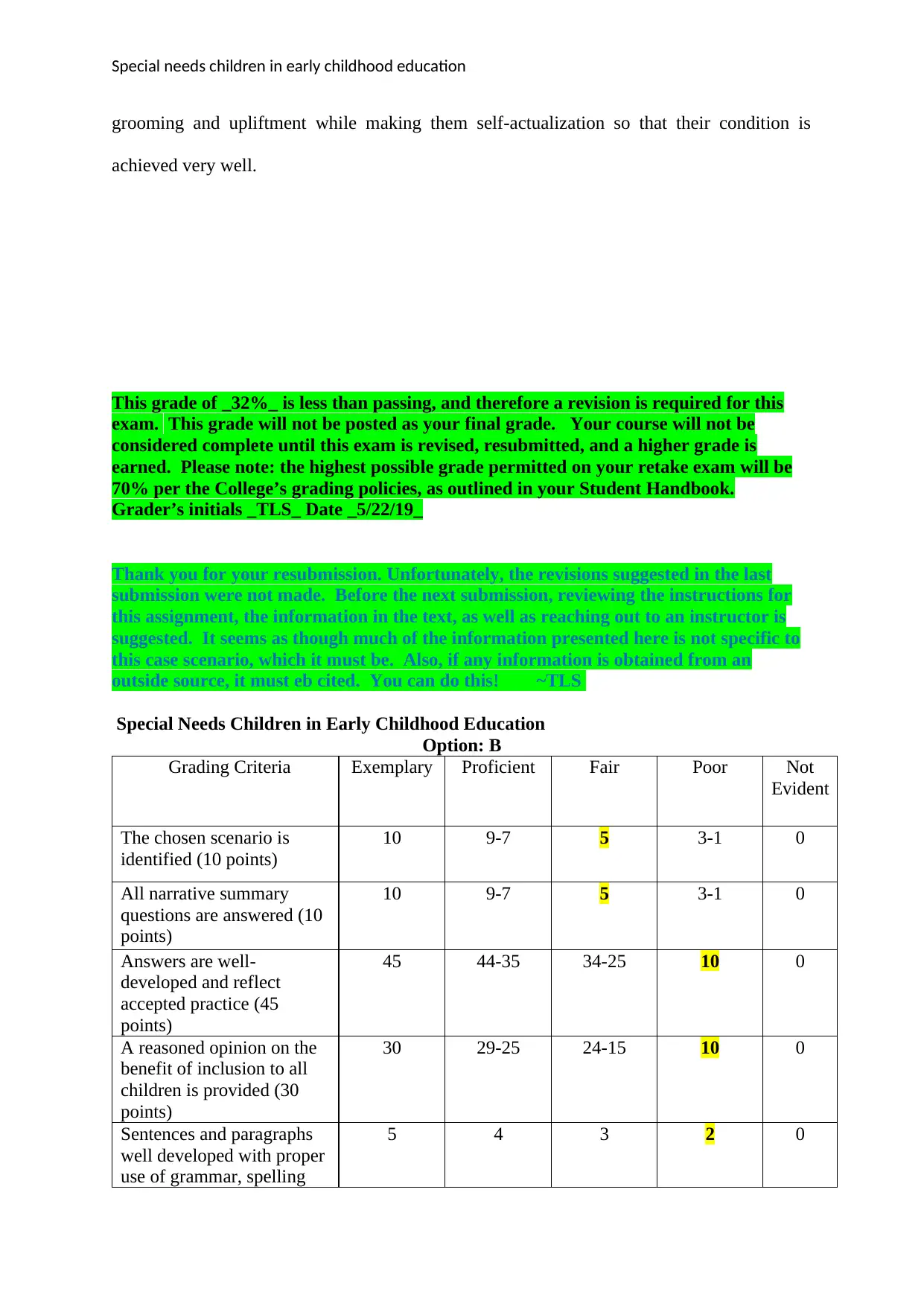
Special needs children in early childhood education
grooming and upliftment while making them self-actualization so that their condition is
achieved very well.
This grade of _32%_ is less than passing, and therefore a revision is required for this
exam. This grade will not be posted as your final grade. Your course will not be
considered complete until this exam is revised, resubmitted, and a higher grade is
earned. Please note: the highest possible grade permitted on your retake exam will be
70% per the College’s grading policies, as outlined in your Student Handbook.
Grader’s initials _TLS_ Date _5/22/19_
Thank you for your resubmission. Unfortunately, the revisions suggested in the last
submission were not made. Before the next submission, reviewing the instructions for
this assignment, the information in the text, as well as reaching out to an instructor is
suggested. It seems as though much of the information presented here is not specific to
this case scenario, which it must be. Also, if any information is obtained from an
outside source, it must eb cited. You can do this! ~TLS
Special Needs Children in Early Childhood Education
Option: B
Grading Criteria Exemplary Proficient Fair Poor Not
Evident
The chosen scenario is
identified (10 points)
10 9-7 5 3-1 0
All narrative summary
questions are answered (10
points)
10 9-7 5 3-1 0
Answers are well-
developed and reflect
accepted practice (45
points)
45 44-35 34-25 10 0
A reasoned opinion on the
benefit of inclusion to all
children is provided (30
points)
30 29-25 24-15 10 0
Sentences and paragraphs
well developed with proper
use of grammar, spelling
5 4 3 2 0
grooming and upliftment while making them self-actualization so that their condition is
achieved very well.
This grade of _32%_ is less than passing, and therefore a revision is required for this
exam. This grade will not be posted as your final grade. Your course will not be
considered complete until this exam is revised, resubmitted, and a higher grade is
earned. Please note: the highest possible grade permitted on your retake exam will be
70% per the College’s grading policies, as outlined in your Student Handbook.
Grader’s initials _TLS_ Date _5/22/19_
Thank you for your resubmission. Unfortunately, the revisions suggested in the last
submission were not made. Before the next submission, reviewing the instructions for
this assignment, the information in the text, as well as reaching out to an instructor is
suggested. It seems as though much of the information presented here is not specific to
this case scenario, which it must be. Also, if any information is obtained from an
outside source, it must eb cited. You can do this! ~TLS
Special Needs Children in Early Childhood Education
Option: B
Grading Criteria Exemplary Proficient Fair Poor Not
Evident
The chosen scenario is
identified (10 points)
10 9-7 5 3-1 0
All narrative summary
questions are answered (10
points)
10 9-7 5 3-1 0
Answers are well-
developed and reflect
accepted practice (45
points)
45 44-35 34-25 10 0
A reasoned opinion on the
benefit of inclusion to all
children is provided (30
points)
30 29-25 24-15 10 0
Sentences and paragraphs
well developed with proper
use of grammar, spelling
5 4 3 2 0
⊘ This is a preview!⊘
Do you want full access?
Subscribe today to unlock all pages.

Trusted by 1+ million students worldwide

Special needs children in early childhood education
and punctuation (5 points)
and punctuation (5 points)
1 out of 10
Related Documents
Your All-in-One AI-Powered Toolkit for Academic Success.
+13062052269
info@desklib.com
Available 24*7 on WhatsApp / Email
![[object Object]](/_next/static/media/star-bottom.7253800d.svg)
Unlock your academic potential
Copyright © 2020–2026 A2Z Services. All Rights Reserved. Developed and managed by ZUCOL.





